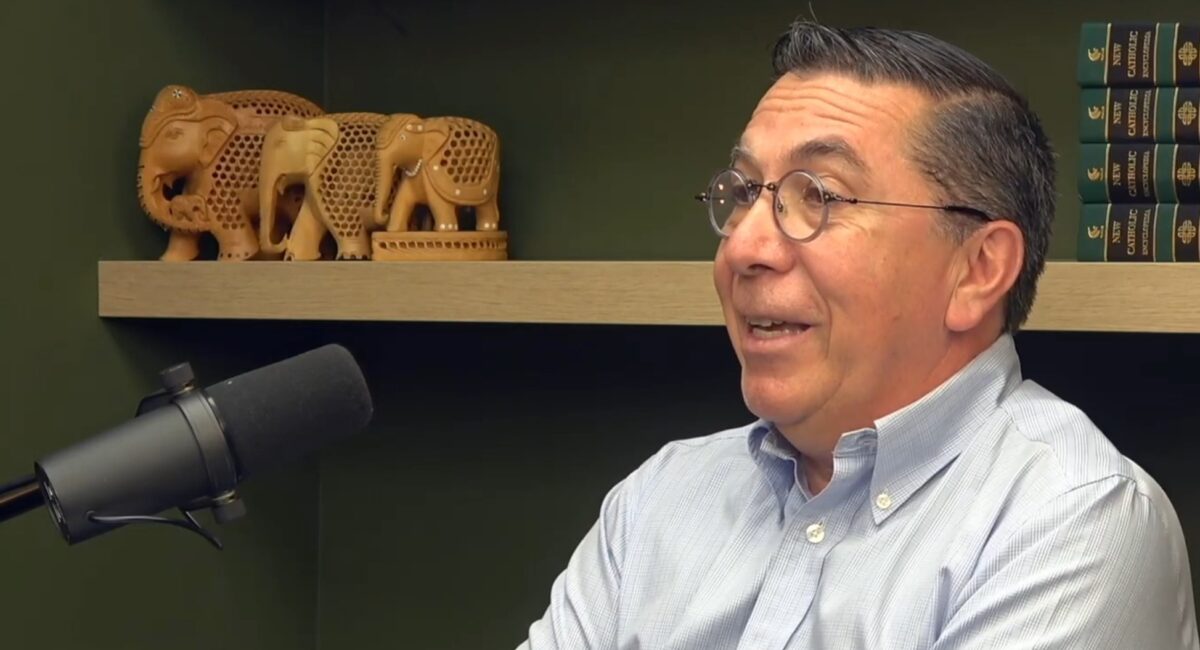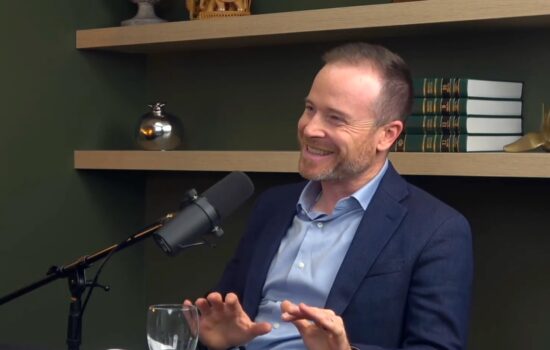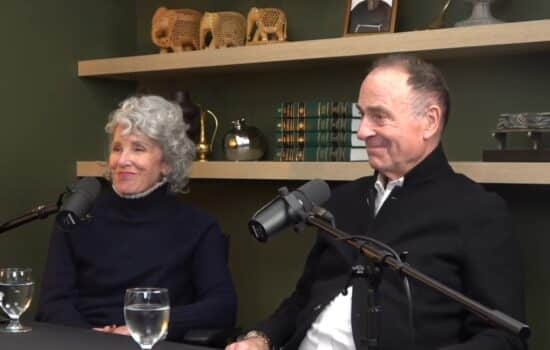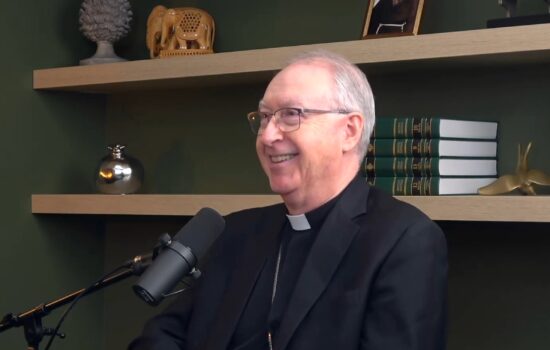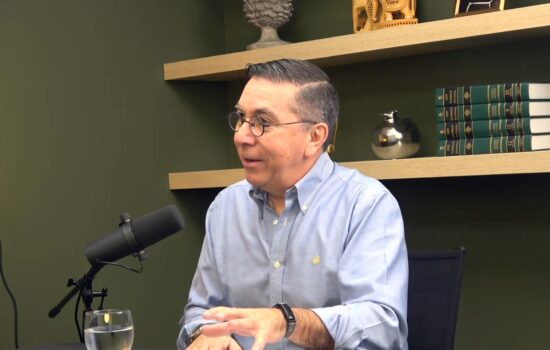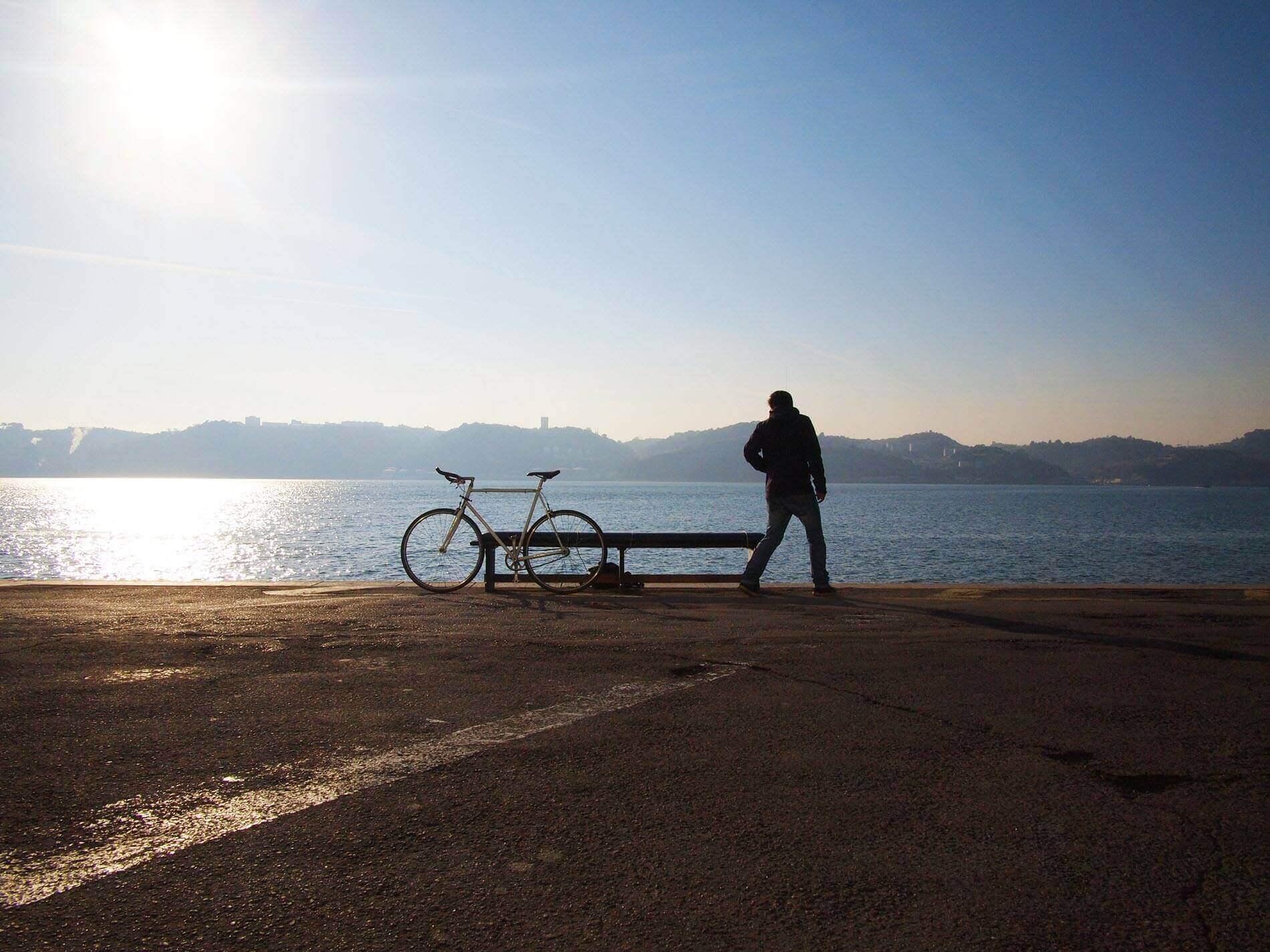Chapters:
00:01 Intro
01:23 From Tech Entrepreneur to Philosopher & Educator
03:16 Teaching Business Ethics in a Secular World
05:10 Purpose of Business: Service vs. Profit
12:02 Media’s Influence on Youth and Education
22:45 Aristotle, Virtue, and the Path to a Flourishing Life
33:38 Catholic Education, Family, and Faith in Formation
35:26 Teaching, Family, and the Battle for Young Minds
37:01 Media Influence: Violence, Disney, and Stereotypes
52:34 Society in Decline: Confusion, Freedom, and Birth Rates
56:28 Aristotle on Happiness and Human Flourishing
1:05:42 Catholic Education and the Formation of Virtue
1:09:56 Government vs. Parents in Education
1:19:12 Final Reflections on Truth, Family, and Faith
1:25:46 Outro
If you are interested in our school, make sure to check out our website:
https://www.sjp2academy.com/
Follow us on social media:
Watch on YouTube
Instagram: https://www.instagram.com/sjp2academy/
Facebook: https://www.facebook.com/sjp2academy
X (formerly Twitter): https://x.com/SJPIIAcademy
This episode of Catholic Education Matters features a powerful conversation between host Troy Van Vliet and Professor Rolando Islas, a philosopher and ethicist with a rich background in business, technology, and academia. Together, they explore the deeper purpose of business beyond profit, the challenges of teaching ethics in today’s secular environment, and the dangers of a culture obsessed with money, fame, and media-driven comparisons. Drawing on Plato and Aristotle, they reflect on how virtue, balance, and purposeful struggle shape character and happiness, while also critiquing modern education systems, government overreach, and the erosion of family’s role in moral formation. Ultimately, the discussion underscores the importance of Catholic education and strong family values in guiding young people toward truth, virtue, and a flourishing life.
Transcript:
[00:00:01] Intro: Welcome to Catholic Education Matters, the podcast that celebrates the beauty of Catholic education, highlighting excellence in academics, athletics, and the transformative power of faith. Join us as we share the stories of those making a lasting impact on Catholic education. Let’s begin.
[00:00:25] Troy Van Vliet: Good day everyone and welcome to Catholic Education Matters. My name is Troy Van Vliet and I am excited today to be here with Rolando Islas.
[00:00:37] Thank you so much for coming Rolando. I am so excited to have you because we well, we’ve been talking a little bit before we started here already, and there’s so many things that we have to talk about today. So Oh, yeah. I’m I’m very happy to have you here.
[00:00:52] Rolando Islas: Thank you, Troy, and thank you for the opportunity to come and talk about work. As I was telling you, we philosophers are these rare breed that we love to talk about work. It’s always exciting.
[00:01:05] Troy Van Vliet: Yeah, that’s great. That’s great. Well, have quite a robust bio here as well. And if you don’t mind, I’d like to read some of it out here just to kind of give the audience a chance to get to know you, what you’re all about. And so first of all, have your doctorate philosophy and having researched thesis on the nature of belief.
[00:01:28] Rolando Islas: That’s correct.
[00:01:29] Troy Van Vliet: That’s an exciting thing. Okay. So you have your master’s in philosophy of science and master’s in business administration and master’s in information technology. You’ve established your first software development company as a young adult and grew it to international scope nearly thirty years later, selling the enterprise in 2019. And since then, you’ve, dedicated full time to academia and research with over twenty years of teaching experience.
[00:01:59] And your interests are focused on the convergence of technology, philosophy and belief covered partially in a book on digital humanities published by McGraw
[00:02:13] Rolando Islas: Hill.
[00:02:13] Troy Van Vliet: Sorry, McGraw I read that wrong. And a number of papers within a similar scope. Now your teaching experience covers a wide range of courses from business management to philosophy related programs. You are a member of the board of Vancouver Foundation, of Art, Justice and Liberty, and your research is currently in the field of philosophy of technology in collaboration with the Universidad del Desar You can say it.
[00:02:46] Rolando Islas: Del Desarroyo in Chile.
[00:02:48] Troy Van Vliet: In Chile. All right. And Universita Campus Biomedical in Roma, Italy. So, I mean, you’re a full time professor of moral philosophy, business ethics and ethics of mass media at the University of Canada West.
[00:03:05] Rolando Islas: That’s correct. Wow.
[00:03:07] Troy Van Vliet: Wow. So you are more than accredited and you are gonna have a great time chatting today with some of the topics that we have Oh yeah, I do to so. Of all, question to get us started. Can you tell us about the course that you’re teaching on business ethics and how it integrates protective values with our faith?
[00:03:32] Rolando Islas: Okay. Well, that is a challenge because, you know, teaching in Canada nowadays, it has to be very neutral. You you cannot really make any reference to, to religion, beliefs, or or whatever, which is
[00:03:51] Troy Van Vliet: Right.
[00:03:51] Rolando Islas: Is is challenging for a philosopher. We are usually
[00:03:56] Troy Van Vliet: And you’re referring specifically in the sorry to interrupt, but in the public system.
[00:04:00] Rolando Islas: In the public system. Yes. Well, I was teaching before City University of Seattle, which is extremely liberal. We even have to sign a contract where we state that we are not going to be heading into any kind of religious belief or It really doesn’t make sense. As I was hired, I told them, I’m a philosopher.
[00:04:32] Philosophers are about beliefs. So, we follow certain rules. And I am a philosopher who was, let’s say, formed under Aristotle Thomistic philosophy.
[00:04:50] Troy Van Vliet: Right.
[00:04:51] Rolando Islas: So I cannot walk away from my beliefs. Exactly. And I, to be honest, I really didn’t care a lot. My classes, my teachings were under my own beliefs. So, what is a challenge today in teaching business ethics?
[00:05:17] Is what is the purpose of a business? Usually, the students will tell you the purpose of a business is to make money. And I’m in total disagreement with that. At the beginning, let’s put it that way, when we began to trade, it was about the service, it was about fulfilling some needs.
[00:05:43]Troy Van Vliet: When
[00:05:44] Rolando Islas: we get into this extreme capitalism, this model leads us to the almighty money. The only thing that matters, is that it seems to be like the door or the gateway to happiness, and it is not. I mean, if it was if it was truth, I mean, Donald Trump and Elon Musk will be the happiest people on Earth. And they don’t seem to be quite there, So it’s a challenge to confront that model. Say, well, we have to think about purpose.
[00:06:25] What is it that we are building towards society? What is the service? What are the goods that we’re delivering? And one of the problems is where is that this model comes from? I mean, this model how is that this idea that money is going to make you happy nests in our heads?
[00:06:52] And that has to do a lot with media. Right? And all of these craziness that we have in terms of the amount of information that we have to process. It’s quite interesting when you get into a classroom. And I usually do this exercise with my students and I ask them, I tell them, I am the genie in the bottle.
[00:07:20] I can give you one gift. Just ask whatever you want. Usually, the answer will be: I want to be rich, or I want to be famous. And famous people are rich.
[00:07:32] Troy Van Vliet: They’re rich, yep.
[00:07:33] Rolando Islas: So But when I ask them why, they struggle to explain why is that someone wants to be rich. Because money comes with a lot of demands, I tell them. It’s always a trade. Mean, you’re going to have a trade off with whatever you possess. So, what is the trade off with money?
[00:07:57] Well, I also put this example like, let’s imagine that we buy the lotto $6.49 for this Friday. So, we go to bed being poor and we wake up the next day with $60,000,000 in the pocket. What is the first thing that you lose? And they struggle and we have a lot of discussions, but usually we get to the same answers consistently. It’s, we lost trust.
[00:08:28] Now I’m not sure why people are getting close to me. And the other one is, what is the greatest fear that surges with money is the fear of losing it.
[00:08:41] Troy Van Vliet: Of losing it, yep.
[00:08:43] Rolando Islas: So, then you have to I mean, instead of having this freedom to enjoy life and do whatever you want, you have to learn about money. You have to get the lawyer. You have to get an accountant. Have to get the financial advisor. You have to really understand what is going on.
[00:09:01] So, everything comes with these trade offs. The problem is that we are well, one of the problems is I don’t want to be reductive. One of the problems is that we’re losing the ability to reflect on why is that I want this? Why is that I want that? Yeah.
[00:09:23] So, the one of the main concerns today is that people cannot see their wealth. We’re always looking up. Oh, We cannot see what we have.
[00:09:37] Troy Van Vliet: Yeah. Nobody looks below them and sees what they have over everybody else. They’re always looking up. Yeah. Right.
[00:09:46] Do I don’t have this. I don’t have that. And it just continues on in that battle that you’re trying to strive for more always.
[00:09:55] Rolando Islas: Yeah. And that’s a problem because that generates a lot of anxiety. It does. I am never where I want to be. I am always wishing for what the neighbor has and keeping up with the Joneses, it’s become like the rule of the day.
[00:10:13] Now, technology, to keep up with the neighbors, you just have to go out and look what the neighbors. So the neighbor has a new car or what. Now we have it in our phones. We have it in all the screens that we are related to.
[00:10:32] Troy Van Vliet: Now we see what neighbors have around the world.
[00:10:35] Rolando Islas: Yeah. On every street. Exactly.
[00:10:37] Troy Van Vliet: Everywhere. In fact, you can see on every street, Google Maps and you go to Street View and you can see everything everywhere.
[00:10:43] Rolando Islas: Oh yeah.
[00:10:44] Troy Van Vliet: Around the world. Anything that you want to see. It’s a massive, massive distraction.
[00:10:48] Rolando Islas: Now think in terms of education, what is that we are putting in the heads of our youth today? Is this anxious disease of I’m never going to be able to have enough. I have a very anxious kid at home. And I remember he took my attention when he was eight years old because he had all the numbers that an eight year old can do. Right?
[00:11:28] But all the numbers of how much money he had to make in order to buy a house in Vancouver. Oh, wow. And that’s anxiety. That is really, really
[00:11:40] Troy Van Vliet: That’s a big mountain to be climbed in Yeah. The Oh, wow. So, are we teaching our kids in school? So what are we teaching them about life and about the meaning of life and what have you, you know, public system versus our private system too, specifically say our Catholic system. What are we teaching them?
[00:12:04] Where are we going wrong?
[00:12:07] Rolando Islas: That is a complicated matter.
[00:12:11] Troy Van Vliet: I know it’s not on the list of questions here, but
[00:12:14] Rolando Islas: But it’s I mean, first of all, we need to understand that education has or that our generation has been relying a lot on the institutional education. But we are worth forgetting that also media educates. And nowadays we’re exposed to media in lots of ways. I love this quote from Plato. He’s probably the first philosopher that got to question media as a tool for educating youth.
[00:12:57] And of course, I mean, media in his days were he talked about music, he talked about the example of adults, he talked about the culture, He talked about stories. But if you bring all of that into our days, is you will have what we call mass media. What is mass media? Everything, medium is something that is delivering.
[00:13:28] Troy Van Vliet: It’s intentional. There’s something that trying to get you to do or to act on or
[00:13:35] Rolando Islas: Yeah, and media is what it delivers is information. Now, I love the and this is how Plato approaches it. He says, well, the problem is in information. The root of the term is the Latin word will be informari. So, it’s forming something.
[00:13:58] So, what Plato sees as forming is shaping the soul. Information shapes the soul of individuals, especially the youth. The youth are more he sees the soul of the youth as a more malleable material. So how is that music I mean, shapes the soul of the youth? Would say, well, if you listen to the music that is played in the battle, it gets you to this relationship with courage and fighting.
[00:14:43] But if you listen to melancholic music, it makes you weak. So you have to be careful of what music you listen to. Now, if you listen to the lyrics of the music today, mean, Plato will be having a heart attack right now.
[00:15:04] Troy Van Vliet: Oh, yeah.
[00:15:04] Rolando Islas: The other one is stories. He was concerned about the stories of Hesiod and Homer, saying, well, the problem with these stories is that we are letting our kids to learn about all the misdoings of the gods. The gods, I mean, are cheating people, are even sometimes killing people, deceiving, and they have all of these fights. And Plato is concerned about young generations not being able to understand. They are not mature enough to handle these mythologies.
[00:15:54] And we are in the middle of this mythological craziness nowadays. We have the mythology of youth, the mythology of money that we were talking about, and all of these stereotypes that we follow. And the other one is the culture. What is that overall the culture is telling us?
[00:16:17] Troy Van Vliet: So,
[00:16:21] Rolando Islas: But, I mean, he also relies on the role of the educator. The philosopher is the one who is educating the youth as well. But it’s not the main way. So, how is I mean, going back to your question, how is that the system or the education system should be built, especially nowadays or not be built, we’re facing a lot of changes. I mean, technology is forcing us to change.
[00:16:56] How is that the system is going to change due to technology? It’s another huge conversation. But my point is we cannot rely on being in the education system. Family is one of the pillars that I feel sometimes we are missing. We are relying too much on the educational institutions and we’re forgetting our role as role models.
[00:17:29] Troy Van Vliet: And especially in our public education systems, they want us to forget
[00:17:34] Rolando Islas: our roles.
[00:17:35] Troy Van Vliet: They’re just saying like, no, leave it to us. We’ll take care of the kids. And in fact, if the kids have certain psychological problems or emotional problems or things like that, they don’t even have to tell the parents anymore. It’s like, no, we’re going to handle this at the school. And in fact, if the kid says don’t tell my mom and dad, but I’m feeling I’ve got gay tendencies or something like that or whatever.
[00:18:02] And it’s like: Well, no, we don’t have to tell your parents. Can deal with that right here at school. Or I’m feeling suicidal. We can deal with that here at school rather than telling the parents. Which is horrifying.
[00:18:14] Rolando Islas: It’s crazy. Yeah. It’s just
[00:18:18] Troy Van Vliet: Talk about the nanny state. I mean
[00:18:21] Rolando Islas: no. It needs the control state. Basically what they are looking for is to build a certain way of thinking or a stereotype that can be controllable. And if you don’t have this relationship with your parents, that it’s a hierarchical relationship and the parent becomes the government, then you just follow. And the government is going to be the one that going to be solving everything that you need.
[00:18:55] Troy Van Vliet: They want more government reliance. The government loves that, the government lives on that, thrives on that. Even if you’re a politician that gets into politics for good reasons, it’s quite easy to fall into that trap once you’re in there that more government is good, less government is bad. Know, it’s like, well, we want to have more spending because the more we spend, the more we rely on government and like $10 a day childcare. You know, you hear things like that and you’re like, why do we have anything from the government for childcare?
[00:19:26] Why are we not taking care of our own kids? This is insanity. The more we rely on government, the bigger government gets and the more we become a socialist society, which is what at the end of the day they want. But at the end of the day it collapses because those types of governments have never, our society have never flourished around the world.
[00:19:48] Rolando Islas: Yeah, because I mean, at the end, what makes you creative, what makes you thrive is our challenges. If you take away all of these challenges, there’s nothing. If you rely on the magic genie to solve everything, then what is your role?
[00:20:12] Troy Van Vliet: What is your role? And you’ve seen societies or different cultures that get destroyed by giving them everything for nothing. And, you know, I see our poor indigenous communities, we’ve destroyed them by just constant handouts and not, you know, there’s a hand up versus a handout and we need more hands up than handouts. It doesn’t get solved with a check. Know, you just talked about that with winning the lottery, you know, that’s a whole another form of anxiety and it also takes away people’s purpose and meaning when they’ve got nothing to do.
[00:20:52] You just give me checks. We all heard about the spoiled child, you know, where they’ve just they’re given everything. Well, you’ve just destroyed them. They haven’t had to work for anything. Haven’t had to learn the value of money or whatever.
[00:21:02] Just write them checks, write them checks, give them cards, and they can spend whatever they want to spend. And mom, dad, I need more money. And then you’ve destroyed that kid.
[00:21:10] Rolando Islas: Of course. I usually put these or play with these analogy in the classroom. I tell them again, the genie. I’m the genie in the bottle, now I am going to give you anything that you want.
[00:21:22] Troy Van Vliet: The
[00:21:23] Rolando Islas: only thing that I am going to restrict is related to time. I cannot bring you back to the point where you’re beginning to wish. In fact, I tell them, you don’t even need to wish. I am going to know what you want and in an instant, I am going to give it to you. Yeah.
[00:21:39] And then the question is, am I a good genie or an evil genie? And they end up realizing that I am an evil genie because I took away their purpose. You destroyed them.
[00:21:53] Troy Van Vliet: You destroyed them.
[00:21:54] Rolando Islas: Yeah. There’s nothing. So what is the purpose of life if you don’t have any purpose, any challenge, any project? Yeah. So we forget this.
[00:22:07] Challenges are the ones that end up forging the personalities. Plato will tell you, this shapes the soul. It makes you stronger. It makes you wish to pursue some sort of project, of building. So
[00:22:29] Troy Van Vliet: Plato talks of balance being a big That’s Aristotle. Aristotle, yes.
[00:22:34] Rolando Islas: Aristotle, it’s all about balance. He sees he talks about these the term in Greek is ‘phronesis’. So, ‘phronesis’ is the translation would be flourishing. It’s a flourishing It’s about about happiness. So so he sees that everything gets destroyed by excess.
[00:23:00] Troy Van Vliet: Mhmm.
[00:23:01] Rolando Islas: He specifically, he says in his ethics, it’s in the nature of things to be destroyed by excess. And, so how is that you balance any excesses is through virtuous. This is why his ethics are known as virtue ethics. So, it’s a way to gain balance only balance Balance
[00:23:26] Troy Van Vliet: through virtues. Okay.
[00:23:28] Rolando Islas: So, only virtuous people can access to happiness, to a flourishing life.
[00:23:33] Troy Van Vliet: Right. And we had Doctor. Abella on our podcast and his book that he has out, it’s called Super Habits. Is that correct, Silvery? Super habits, yes.
[00:23:49] And it’s all about virtues and super habits built through virtues. Aristotle would love that book.
[00:24:00] Rolando Islas: Oh, absolutely.
[00:24:04] Troy Van Vliet: It’s fascinating. And we have to put those in the forefront for our kids, more so, these virtues in order to be virtuous, in order to have that sense of meaning and purpose in life. We need to have those. And those will all align with our faith, with our Catholic faith. And
[00:24:25] Rolando Islas: this role of family or the education in the core of the family gets very relevant, as you were saying. All of these ideologies that are surging today, they come like dressed up as moral trends. It’s who doesn’t want to accept everyone? Oh, And I mean, I have these conversations with my kids at home. It’s like, well, what is wrong with that?
[00:25:08] If people want to do this or that or they have this preference or whatever, what is wrong? And like, well, what is wrong? There’s a lot of suffering around these strengths. It’s not right going or letting young kids to have all of this information. It’s just like Plato was saying, you don’t expose the youth to these stories from Homer and Nasiot because they are not mature enough to understand what is going on.
[00:25:51] If we expose young kids to all of these definitions, it’s just like getting a kid into a classroom full, let’s say, getting a boy into a classroom full of girls, 10 years old, and telling them that they have to choose a wife.
[00:26:10] Troy Van Vliet: I mean, that’s a great analogy.
[00:26:13] Rolando Islas: Yeah, it makes no sense. Yeah, It’s a life changing decision.
[00:26:17] Troy Van Vliet: Exactly.
[00:26:18] Rolando Islas: So, we have to address these issues at home. We have to guide our kids in ways that we align with our beliefs.
[00:26:28] Troy Van Vliet: And they got to pull some of those topics out of the schools.
[00:26:31] Rolando Islas: Of course.
[00:26:32] Troy Van Vliet: Yeah. Like the SOGI programs that are not mandatory in schools, in the public school systems right now, but they’re encouraged. And for kids today to be whatever they want and do whatever they want. And it includes, you know, if I think I’m a cat, I’m going to bring a litter box to school and that’s where I’m going go to the bathroom. And that’s okay is what they’re teaching.
[00:26:57] And it’s wrong. And that’s the same analogy as letting a kid choose their spouse when they’re 10 years old. That’s crazy. You never let that happen. Why are we letting them believe that they are of the opposite gender?
[00:27:11] Why are we letting them Why are we going down that road?
[00:27:13] Rolando Islas: And think about this, it’s just like we have been here before. I was telling you before we began, these cycles of humanity seem to happen again and again and again, and we don’t learn from history. But I like to go back to the Greek philosophers, and this is also Plato who said that when adults begin to behave like kids, and kids follow these behaviors, what we have is the search of tyranny. So, we are there. I mean, these behaviors about being a cat or I was reading the other day a guy, a Canadian guy, that he identifies himself as trans age.
[00:28:13] And I was curious about the term, like, what is a trans age? So, he’s a 57 year old guy who was married for a long time, has seven kids. And all of a sudden he feels like he is or he identifies himself as a 12 year old girl. And he’s fighting to have the rights of a 12 year old girl. And of course, among the rights, and this is where it gets crazy, among the rights, he wants to be adopted.
[00:28:43] He wants to go to school with 12 year old girls. And of course, he doesn’t want to pay any
[00:28:48] Troy Van Vliet: Look at me for laughing.
[00:28:49] Rolando Islas: Anything that has to do with his ex wife or kids because he’s a 12 year
[00:28:55] Troy Van Vliet: old girl. Because he’s identified as a 12 year old girl.
[00:28:57] Rolando Islas: And the worst part is that there’s a couple that is willing to adopt him as a 12 year old girl. Well, if you ask me, these
[00:29:08] Troy Van Vliet: And they’re 12 year olds identifying as adults, probably.
[00:29:13] Rolando Islas: And it is I mean, these cannot be okay
[00:29:16] Troy Van Vliet: if The I wheels are falling off. They are falling off. And how bad does it have to get? Well, I see people pushing back, starting to push back more now. Before if you push back, you were called a bigot or a transphobe or, you know, the list goes on and on.
[00:29:32] You know, the comebacks are name calling you know and it’s like oh well you’re this you’re a label and so you’re just like oh I guess I don’t want to be that label so I better not say anything. I’m thinking this but and I know this to be true but I better not say it out loud. But people are starting to say it out loud more now. Not enough but more.
[00:29:55] Rolando Islas: Of course. And I think that, I mean I was born and raised in Mexico. Things are way more aggressive there.
[00:30:05] Troy Van Vliet: In what way? People
[00:30:08] Rolando Islas: are more direct and we are used to confrontations. We’re used to express our,
[00:30:17] Troy Van Vliet: truths or the truth. And
[00:30:23] Rolando Islas: various ways is a more conservative country and ideological.
[00:30:32] Troy Van Vliet: What So They haven’t fallen into the woke trap of everything goes,
[00:30:36] Rolando Islas: we have everything goes our all the time. For sure. Again, the government is breeding this conflict between the rich and the poor. It’s getting crazy. So, we have our fair share of craziness there.
[00:30:54] Troy Van Vliet: But
[00:30:58] Rolando Islas: what I was I forgot what I was going to tell you. This comes with age.
[00:31:04] Troy Van Vliet: Oh, yeah. Mexico About
[00:31:08] Rolando Islas: confrontations. So, what I’ve learned in Canada is that Canadians avoid confrontations. They rather react in their own sphere of control. But they react. At some point, if you see the system of the education, the public system going south, what is happening is that people are beginning to educate their kids at home.
[00:31:40] Homeschooling Yeah, is homeschooling is growing
[00:31:42] Troy Van Vliet: in leaps and bounds.
[00:31:43] Rolando Islas: I don’t know why the government is not opening the eye to this. So this is telling you something.
[00:31:50] Troy Van Vliet: Well, it’s still because our government, especially in British Columbia here, they’re still led by the left. Like they’re still left. They’re led by that crowd. And that whole SOGI idea, that got in and passed through parliament as an anti bullying law or program. That’s how it got passed.
[00:32:18] And it got passed by our more right liberal party in the province years ago and now our left wing Democrats are running with it, you know, and it’s being pushed down families’ throats. And there are families that are finally standing up. Now, they’ll vote with their feet. They’ll either walk out and just say, we’re not going to public school anymore. We’re going to choose a private, especially a faith based school that doesn’t have this.
[00:32:43] Or we’re going to homeschool. And there’s homeschool communities too. Like there’s Catholic homeschooling communities like Ascend that are saying, you know what, enough, we don’t trust this system, we’re going to do it at home. And hence our faith based schools are becoming more and more and more important. And putting the faith first in the faith based school is important because that’s something there’s a slippery slope there as well.
[00:33:15] Know, Saint John Paul II is a Catholic school, but we’re not just saying it’s Catholic in name, you know, we’re Catholic in practice and we put that first in our school and that’s a mandate that we’re determined to have it continue on as well.
[00:33:33] Rolando Islas: And I go back again to my previous point, like, let’s say, about Catholic education. If we rely too much on the institution and we don’t leave the values at home, it’s broken. So, it’s not only about relying on professors, teacher, or all of these influences. We have to understand that our kids now are connected through their phones or these digital appendixes that we have everywhere to these cultural inputs. So, this puts a lot of stress into religious institutions because you just don’t I mean, you are not only giving them information, you have also to be the role model that these kids are following.
[00:34:43] And at home, that role model has to be confirmed. Consistently, yeah. Otherwise, it is broken. It is just like the father that tells his kid, Don’t lie. Don’t do these.
[00:34:57] Don’t be aggressive. And as soon as he can, he sees that lying and being aggressive. So, then you have what, for example, in technology is called the alignment data. It’s artificial intelligence. At the end, it’s modeled human behavior, on human intelligence.
[00:35:24] So, these models are first, the first inputs are are teached. So, you put a lot of data and you steer the model into something. And then there are some questions like, well, what are the values that the model is actually building or it’s managing. And if you don’t like the values, then you put alignment data. So, to reteach these, we do the same.
[00:35:59] We are the I mean, the family is where we align the information that our kids get.
[00:36:08] Troy Van Vliet: Right.
[00:36:09] Rolando Islas: Where we explain all of these models that come from the different media. Nowadays, have a myriad of media. We should be concerned, for example, about the series that our kids watch. We should be concerned about the video games that our kids play. We should be concerned about so many things.
[00:36:37] All of this is education. Remember, Play Doh says this is what forms, what shapes the soul. And the soul is the one that is going to lead us to our beliefs. And our beliefs lead us to choose And then into action. Yesterday, I was watching the news and there was this piece of news that really gave me the shivers because there’s these this assassination that there was this girl, teenage girl, that was killed in a brutal way.
[00:37:20] I don’t even want to describe it.
[00:37:22] Troy Van Vliet: And
[00:37:23] Rolando Islas: when the police were trying to find the motive, nothing was making sense.
[00:37:30] Troy Van Vliet: But
[00:37:31] Rolando Islas: they were able to figure out who did it and whatever. It was another kid. It was another teenager. When he was asked, Why? What, I mean, what is the motive to do this?
[00:37:42] He said, Well, I was watching this series, Dexter. Oh. And I was following this chapter that, and I thought like, Man, what are we doing? And what is the responsibility on the people who do this series? I mean, making money will never justify the atrocities that we see in media.
[00:38:13] Troy Van Vliet: No, it’s absolutely incredible. The brainwashing and indoctrination in Hollywood Right now, speaking of Hollywood, we can talk about Disney. The Disney model that we were talking about before we started here today. What is the Disney model and how is it affecting our kids and how is it changing? How is it evolving?
[00:38:42] Enlighten us.
[00:38:43] Rolando Islas: Before getting into the tech bubble, one thing that we we need to pay attention.
[00:38:51] Troy Van Vliet: Mhmm.
[00:38:51] Rolando Islas: And there are always these these signs when things are are going south. And depending on the age of our kids, we should really, really pay attention. For example, all of these violence in video games, in this series, and even in Disney. Disney has its dose of soft violence. Yeah.
[00:39:19] Are usually reflected in in some trends in society.
[00:39:24] Troy Van Vliet: Mhmm.
[00:39:25] Rolando Islas: Think about this. How many mass shooters in The US or in whatever in the world are women? Is
[00:39:35] Troy Van Vliet: virtually none.
[00:39:36] Rolando Islas: Virtually none. So it tells you something is who are the main customers of violent video games? I mean, what is the nature of a male? We are in nature more prone to violence. And the other violent I mean, on the other side, we see this trend of girls getting attention in social media by showing more.
[00:40:05] We should be concerned about that. That is not right. That leads to
[00:40:10] Troy Van Vliet: That’s that out of balance thing.
[00:40:12] Rolando Islas: Yeah. And that links, I mean, for I’m talking about the Disney Mobile. These I mean, Disney is is a transgenerational company. We grew up with Disney. We grew up with the stories.
[00:40:28] Mhmm. And as Marshall McLuhan, the Canadian scholar and ideologist of media said, well, the medium is the message, which I will change a little bit. It will say, The medium is also a message. Because there are many messages. So, when we see the story in Disney, the princess and the prince and usually the princess is a beautiful girl that is naive and is weak and there’s always someone, some evil witch that wants to destroy her just because of her beauty, it tells you a lot about the feminine side.
[00:41:25] So, Right? Beautiful girls are weak. Beautiful girls need to be rescued. And you are going to be rescued if you are beautiful. If you are not beautiful, well, you probably have to be playing the role of the witch or the role of no one.
[00:41:46] Now, the prince is handsome. He is valiant and he’s a prince, so he’s rich. He has this white horse. So, if you are not into the stereotype of the prince, then who you are.
[00:42:04] Troy Van Vliet: And who are you? Exactly.
[00:42:08] Rolando Islas: And the main idea is that that is the way to happiness. You find your princess, you find your prince, and then you live happily ever after.
[00:42:20] Troy Van Vliet: Right.
[00:42:21] Rolando Islas: Which is, I mean, we know that by definition that is absurd. You find your princess and you find your prince and then you have to go through this project that is very complicated.
[00:42:35] Troy Van Vliet: Right? And you duke it out for the rest of time.
[00:42:38] Rolando Islas: So, comes with challenges. And the main challenge is that the princess is going to well, the prince as well. We are going to get old and we are going to lose our beauty and we are going to go through all sorts of changes. And happily ever after is complicated, right? But it’s In philosophy, there’s this root that is called semiotics.
[00:43:09] So semiotics is the study of science.
[00:43:12] Troy Van Vliet: So
[00:43:15] Rolando Islas: all of these images come loaded with information. So I go back again to this idea of forming the soul forming an idea.
[00:43:27] Troy Van Vliet: Right.
[00:43:28] Rolando Islas: So, what is the information that comes, for example, with a princess? In order to be beautiful, you have to look in a certain way. So, you just have to look into the how is that the princesses, Disney princesses look? They have these impossible bodies, right? And now you have a princess for every race.
[00:43:55] You have the Mexican princess, you have the I mean, it’s not Mexican, but it’s Pocahontas.
[00:44:01] Troy Van Vliet: Yeah, yeah,
[00:44:01] Rolando Islas: yeah. And then you have the probably the Norwegian princess that is Snow White and then there you go. Yep. So, there’s a model that you can identify with yourself or with your heritage. And so, in order to be like that, you want to follow the stereotype.
[00:44:24] And then you have Barbie. Barbie is a stereotype of the the American girl, beautiful girl. Blondes have more fun. I mean, in the movie, Barbie can jump from the roof of her house and she floats down to a pink Cadillac or whatever. So that is telling you a lot.
[00:44:47] It’s loaded with information. If you look like that, you have a perfect life. So what happens when you look like that and you realize that you don’t have a perfect life? Or what happens in a young mind when you don’t look like that
[00:45:04] Troy Van Vliet: and
[00:45:05] Rolando Islas: then you justify your imperfections? That is a lot of anxiety. And then we begin to change. And now you open, we have a very dark door. Because if I don’t comply with that model, I might comply with all of these different models.
[00:45:26] And I can transition to whatever model I want.
[00:45:32] Troy Van Vliet: Through surgery or through drugs or through talked about through obsessions of eating obsessions and anything to be able to transform into that of which I think I will be happy if. And that even can be of the other gender, whether I’ll just say, well, I’m not happy, so it must mean this needs to change or that needs to change or this needs to change. And, you know, when I hear things on the left, it’s like, well, people will justify their actions by saying, well, you know, God doesn’t make mistakes. Well, no, he doesn’t. Then why are you removing your breasts?
[00:46:17] Or why are you trying to have a sex change if God doesn’t make mistakes? What are you doing? He made you the way you are. Be who you are and be the best version of who you are.
[00:46:28] Rolando Islas: And this comes with a lot of pain. It’s just because we are never going to be fully compatible with the model. These models are impossible. I remember once an interview that was on to Cindy Crawford. She was in the cover of Vogue magazine.
[00:46:54] Troy Van Vliet: And
[00:46:56] Rolando Islas: there was one of these reporters that asked her, How does it feel to be Cindy Crawford? And her answer was very clever. Are you talking to her, the image in both? Or are
[00:47:10] Troy Van Vliet: you Because speaking to
[00:47:13] Rolando Islas: she is a different person. She is absolutely photoshopped. That is not me. But that is a model that we see. So the relationship is there.
[00:47:25] And now talking about reinforcement, like in these models of knowledge. If you sell beauty products, what is the stereotype that you cling your products to? The princess. The princess model. Then you coin heavy phrases, slogans are also loaded with information.
[00:47:55] Like, for example, the L’Oreal says, Because you’re worth it. So, if you’re not worth it, you What is your perception of how worth you are? Right. Right? What is your worth?
[00:48:08] Yeah. You want to be beautiful. You want to be like a princess. And, you have to earn it. And you know that the worth is also related to expensive.
[00:48:17] Right. So, and we keep building on this.
[00:48:21] Troy Van Vliet: And
[00:48:23] Rolando Islas: then we talk about women’s liberation. Yeah. That is not liberating.
[00:48:29] Troy Van Vliet: Ah, okay. Let’s go there.
[00:48:31] Rolando Islas: Yeah. Another reinforcement that happens at home, and this is why I am always very concerned about what is going on at home, is, let’s say, as a father. Do you see your teenage girl waking up you know is all undone probably with these pajamas that doesn’t even fit and you know and what is going to be our reaction Our reaction is also information. It tells a lot. You you tell your girl, you look beautiful, even though she’s just waking up and looks like trash truck slammed her.
[00:49:19] Or what is going to be our reaction when she’s all dressed up and is going out to the prom? As the father, you melt. Like, oh, you look beautiful. Well, you’re reinforcing the prince’s model.
[00:49:32] Troy Van Vliet: Right.
[00:49:33] Rolando Islas: We’re all into this game. So, we have to be aware of
[00:49:39] Troy Van Vliet: Can’t overdo that kind of stuff.
[00:49:40] Rolando Islas: Yeah. We have, again, we go back to balance. Yeah. You cannot celebrate that, that your kid is overweight or that he’s getting into some excesses or that it looks terrible all the time. Yeah.
[00:49:56] But you cannot also just, I mean, talk to them when they look in the way that they comply with the even the stereotype.
[00:50:07] Troy Van Vliet: Right, right. Yeah. There’s that balance. There’s that balance and we watch it. We see that happen within families and then we see it happen on a society level as well.
[00:50:20] Because, you know, it’s like it goes through with women’s liberation. It’s like, well, there’s the patriarchy. Men are not nice enough to women or they’re always holding women down and they’re always, you know, to the point where so we try and, you know, level some of that out and say, okay, yeah, well, you know what, men, maybe you do need to be a little bit more sensitive or a little, you know, have better, know, well, sensitive is probably the best word in terms of expressing your emotions and things like that to your spouse and what have you and to your kids. And then there’s we can’t go too far because now we seem to society seems to do is now we’re trying to feminize men.
[00:51:08] Rolando Islas: And
[00:51:09] Troy Van Vliet: we’re weakening this whole generation of men teaching them that they should be more like women. And then women were telling them, well, should be more like men. And we’ve got this role confusion right now and you’ve got young women saying there’s no good men in the world anymore. And you’ve got men saying, well, you know, women are just too demanding because I need to be this tall, I need to be, you know, have to make this much money, I have to, you know, have this build and what have you. And then I’m afraid of losing my fortune that I’ve built up for so long over a divorce.
[00:51:49] So, and now you’ve got couples just either not getting married, women that are focusing on career to the point where they’re 35, they’re 38, they’re not in a relationship, they don’t have kids. And that’s where society starts, the wheels start falling off. Our birth rate starts in a massive decline in Canada. I think this year is the first year where we’re at a dead level birth rate to death rate. Like it’s the same, we’re not growing anymore.
[00:52:21] We’ll be relying on our immigration for population growth. And that’s not where you want to be as a society. It’s very telling of what we’ve been pushing, you know, be careful what you wish for.
[00:52:39] Rolando Islas: Of course.
[00:52:39] Troy Van Vliet: And so, I mean, I just threw a whole lot of different stuff there, but it all falls in.
[00:52:46] Rolando Islas: I mean, it’s just acknowledging that we’re in the middle of a storm here. And the storm has many fronts. It’s not just education, it’s technology. It’s all of these ideologies. Our idea of freedom is totally out of control.
[00:53:02] We don’t understand freedom anymore. It’s more anarchy than the thing that we understand now.
[00:53:08] Troy Van Vliet: We
[00:53:11] Rolando Islas: want to fight the I mean, what is we don’t have even the chance to win against nature. I got engaged a couple of months ago with another philosopher that he argues that there are no natural rules. Okay, come on, man. This just this rule of it is in the nature of excess that everything I mean, that if a system begins to decay, it will disappear.
[00:53:46] Troy Van Vliet: If
[00:53:47] Rolando Islas: not, just take a look into the third law of thermodynamics. You have your coffee and the coffee when it’s hot as you like it, it’s a perfect system.
[00:53:58] Troy Van Vliet: As
[00:53:59] Rolando Islas: soon as it begins to exchange information with environment, it’s going to decay. Right. And either you warm it up to the point that you like it or it will disappear. Well, that is a natural rule. You cannot fight against that.
[00:54:16] You can change your appearance.
[00:54:18] Troy Van Vliet: But
[00:54:21] Rolando Islas: if you’re a male, you will never ever bear life. Right. And I don’t care how you put it is unless we invent some kind of device that is going to be a technological device that is going to make you better life. But it is not, I mean, it is not the natural rules and we know that nature retaliates. Nature balances itself.
[00:54:48] It’s just this idea of disappearing and recycling. Is nature doing everything? It’s a perfect system.
[00:54:58] Troy Van Vliet: Which leads into we were talking about science and the triangle. Maybe you can delve into that a little bit.
[00:55:10] Rolando Islas: Yeah, it’s, I mean, I usually, as a philosopher, I usually get asked, well, what is the
[00:55:16] Troy Van Vliet: truth? Right.
[00:55:18] Rolando Islas: And, and, I mean, the we need we we love the truth. Nobody loves to to be lied because you are going to make your decisions based on what is that you believe is going to be the truth. So, truth is quite complex because of our limitations. Whenever you go into quantum mechanics, begin to realize like, woah, this is beyond my ability to even think. The way that I ambition the truth is within a triad.
[00:56:02] t’s inside the triangle. The way that I see it is in the base of the triangle, you have science. Science helps you to understand and prove what is in front of your eyes. Then you have philosophy. Philosophy helps you to build the bridge between science and reason.
[00:56:31] You to understand what it means to you and how is that it affects your behavior. But then you have there are questions that cannot be answered without theology. This is my my thesis was on under, David Hume’s Mhmm. Philosophy. David Hume is in my view, he has been overdemonized because of his skepticism.
[00:57:03] But he, he never denies God. He’s aware of this. He knows that his whole building, will come down if, if he goes to these, what he calls pironic skepticism, he needs a figure there to explain natural order. This is why he falls into some contradictions in his dialogues of natural religion, because he attacks religious beliefs all the time, and at the end, he conceals, which is very strange. But he needs these to get into the truth.
[00:57:46] So, the only way that you can establish a dialogue between science and theology is through philosophy.
[00:57:54] Troy Van Vliet: So
[00:57:57] Rolando Islas: there are some questions where we have to, as I was telling you, have to mind the gap between the creator and the creation. We will never understand the reasons why or the methods or but what we can see is the perfection of the creation. Don’t see any failure in nature. I see consequences. And we are complex systems, and complex systems are not linear.
[00:58:32] We tend to think about cause and effect. But everything that we do has ripples, and ripples in time and in space. Yeah. So, whatever we do right now might end up affecting future generations in ways that we have no idea. And then you might be thinking like, why is that we have this disease?
[00:58:56] Is that God is evil? Or is it’s one of his characteristics is that he is evil? No. It’s just that this is the effect of someone making or doing something in another time and in another space. But we are receiving them.
[00:59:19] We’re receiving the effects.
[00:59:21] Troy Van Vliet: That’s a true, that’s so true. Because so many people ask that, you know, when horrible things happen in the world, how could God let this happen? Okay, well, God has given us free will. He’s given us, you know, he didn’t say go and live and I’ll interfere everywhere. I’ll make sure nothing good.
[00:59:37] Well, that may have been the Garden of Eden before the apple was eaten. Know, that was perfect. And then we chose given free will, we chose to go against that. And it’s like, okay, here you go. Now live it.
[00:59:48] The good, the bad, the ugly and everything in between is what we’re living. This
[00:59:55] Rolando Islas: is where one of my concerns when I say that people don’t reflect or we’re losing this ability to reflect because we now have this device that tells us everything. Where to eat? Where is the next gas station? When is it that we are going to arrive? Even who we should date?
[01:00:13] Especially young adults have all these apps. We forget that we are made to believe, which is it’s very ironic when you think about We’re
[01:00:33] Troy Van Vliet: made to believe. What does that what does that mean?
[01:00:35] Rolando Islas: We cannot avoid believing. You can tell me that you don’t believe in anything.
[01:00:40] Troy Van Vliet: And,
[01:00:42] Rolando Islas: well, that is your belief. And then
[01:00:45 Troy Van Vliet: that’s a belief. That in itself is a belief.
[01:00:49] Rolando Islas: Yeah. In logic is called tautology, right? It doesn’t matter how you put an argument. It’s always going to lead you to the same conclusion.
[01:00:58] Troy Van Vliet: Yes.
[01:00:59] Rolando Islas: So, we are wired as human beings to believe. Right. Because belief is the main gear into action. This is where all these stereotypes and models and media and we are in a in a state of of war
[01:01:17] Troy Van Vliet: Mhmm.
[01:01:18] Rolando Islas: Of of trying to build your beliefs. Because if I can get into your beliefs, then I can manipulate whatever it is that you are going to be doing.
[01:01:28] Troy Van Vliet: Right.
[01:01:29] Rolando Islas: So, and we cannot avoid believing. Otherwise, we will be absolutely absolutely static. Yeah. And you can tell me that you’re a skeptic, but then that is your belief. And I can believe in God or not, but that is my belief.
[01:01:45] And that is going to regulate my actions. The other tautology that we cannot avoid is we’re made to choose. Again, you can tell me, well, I choose not to choose.
[01:01:57] Troy Van Vliet: Right.
[01:01:57] Rolando Islas: That’s That’s
[01:02:00] Troy Van Vliet: free will.
[01:02:00] Rolando Islas: Yeah. And these two movements, if you will, these two actions happens in the silence of your soul, of your morality. Only you know what you believe and only you know what is that you want to choose. The only way that I can get a glimpse into your morals is when you act. It becomes ethical.
[01:02:30] So I know if it’s good or not. And then you reveal
[01:02:33] Troy Van Vliet: But ethics where come from? Like, where does that rule? Like, if doesn’t come from faith, if it doesn’t come from theology or religion, where does that come from? How do you measure ethics? Because if it’s all just what you believe and what I believe, then there are no ethics.
[01:02:55] Rolando Islas: Oh, wouldn’t be any. Fall into a total relativism like we are falling now.
[01:03:02] Troy Van Vliet: There’s no right or wrong. Everybody says, well, you can be whatever you want to be.
[01:03:06] Rolando Islas: You want to be a cat? Yeah. Be a cat. That is your problem.
[01:03:09] Troy Van Vliet: Exactly. If we agree with it, if we just go along with it, then you can say that about anything. Pedophilia is fine. Yeah. I feel attracted to kids, so therefore it’s fine.
[01:03:25] That’s the way I feel inside. So, I believe it to be okay. So, therefore
[01:03:28] Rolando Islas: And that’s the argument that many of these
[01:03:31] Troy Van Vliet: people use. So, then there’s no rules against it. All of a sudden there’s no rules. If rules are all just based on feelings, well, and God has given us free will, then we’re in for mayhem and chaos.
[01:03:44] Rolando Islas: Of course. And we are forgetting about one of the of the heavy hitters that brought us here, which is common goodness. If I don’t care about common goodness and I only care about myself, then I isolate myself and I don’t listen to anyone. And by the way, this is happening, right? We hear other people but we don’t listen.
[01:04:11] Yeah. And that is a big problem, especially when it happens in the core of the family. Yeah. We have to listen to the anxieties
[01:04:22] Troy Van Vliet: Without religion you can’t even have common good because common good becomes subjective. If I don’t believe that’s for the common good, if I believe well, I’ll use that horrific thing of pedophilia again if I believe that that’s the common good for everybody, then there is no common good. Where do we get our rules from? Like I said, the West was built on Judeo Christian values. It was.
[01:04:49] That’s how it was built. That’s how it was structured. Our legal system, not the system, but our laws were based on that. Common good, well common good. If we go back to, you know, do unto others what you Okay, well, are biblical.
[01:05:03] These are biblical things.
[01:05:04] Rolando Islas: And this is a way that we came to where we are.
[01:05:07] Troy Van Vliet: Right.
[01:05:09] Rolando Islas: Through caring, through each other. There’s a philosopher that I mean, I don’t agree with these ideas, especially regarding religion.
[01:05:24] Troy Van Vliet: But
[01:05:28] Rolando Islas: he talks about rational disagreement. As long as there’s dialogue and there’s reason and there’s common goodness in the middle, we can rationally disagree. We can disagree on your beliefs and you can disagree on my beliefs. What we cannot disagree is in common goodness. What are we building towards the future?
[01:05:54] And this is, again, going back to basics to Plato, this is his main concern, getting this ideal republic. And in order to get this ideal republic you have to care about common goodness.
[01:06:07] Troy Van Vliet: But where does common goodness come from though? That’s what I’m getting at. Without religion, without a faith, without a common belief system in a religion, how can you determine what common goodness is?
[01:06:23] Rolando Islas: Common goodness is about caring about your needs. It’s like Yeah,
[01:06:26] Troy Van Vliet: but my needs might be, once again, might be pedophilia. That’s my need.
[01:06:32] Rolando Islas: Then again, in a complex system, to foresee the future. What is going to happen to kids is like these practices
[01:06:45] Troy Van Vliet: Well, sexualize the kids but sexualizing kids isn’t a bad thing. Mean, I’m just playing the devil’s advocate here but that’s where I’m saying if we don’t have a rule book to follow that we agree on, which, you know, once again the foundation of the West was Christianity that’s built it. Well, we had a common belief on what is right and what is wrong.
[01:07:12] Rolando Islas: Emmanuel Kant will come to help us. You know, Kant was all about strict rules. So, his ethics are known as deontology. So, he has the deontological proof. So, he says, well, in order to know when you’re in doubt about what is right or wrong, you have to universalize the premise that you are trying to prove.
[01:07:48] So, for example, is, let’s say that cheating is, would you like to live in a world where everyone, with no exceptions, is going to cheat? This is the action that you are trying to avoid. I am about to cheat on you, so I need to know if this is right or wrong. If the answer is yes, then the action is morally acceptable. If the answer is no, then you know that something is wrong.
[01:08:24] So you have to dig in to see why.
[01:08:27] Troy Van Vliet: So what if the answer to the twisted pedophile, what if the answer is yes? What that person has the answer that yes, I would live in a world where pedophilia is fine?
[01:08:40] Rolando Islas: Then according to Kant, that will be right. But this is universalizing everything, so I am going to hurt your kid as well, because you are letting me.
[01:08:52] Troy Van Vliet: Well, okay. So the argument would then be is I’m gonna hurt your kid, but only because we haven’t sexualized our kids properly. So we’re hurting our kids because our kids don’t understand. We have to teach them that it’s okay. I’m taking a far extreme here but I’m saying so until we have a common belief system and a common rule, I mean that’s great.
[01:09:15] You can say well you know people have a it’s just common sense that it’s like, well, no common sense comes from somewhere and gets taught actually. It’s not just something that’s innate. It’s in us. It’s not instinct, you know.
[01:09:34] Rolando Islas: Then you can grab again Aristotle and say, well, he talks about practical wisdom. You know that the innocence of a kid is hurt when he’s sexually abused by practical wisdom because you know the effects of of, of that aggression on a kid. You have seen it before. So going into that practical wisdom and taking that as the departure line to universalize Kantian proof, then you know that is wrong. Or I mean, just like these people that now are cats and dogs and are The other day I saw these group of people in the park.
[01:10:26] And I mean, it’s ridiculous, but again, you like to live in a world where everyone behaves like that? We have no future. We know that.
[01:10:36] Troy Van Vliet: Yeah, we see it. So, and we look at it and go that, but those people would. Or you just think they’re uneducated or they just don’t understand. They don’t understand the Cantian proof. They haven’t been taught the Kantian proof yet, so they don’t I
[01:10:54] Rolando Islas: think that at the bottom of their beings, know that they are wrong. They are just provoking. They are getting attention.
[01:11:05] Troy Van Vliet: Well, they’re getting attention, but I think they think it’s right. I think they believe in their own I Many of them feel it’s like it’s a means to an end. Like this is me. This is what I’m about and this is good. This is what makes me feel good.
[01:11:20] Rolando Islas: It’s more than thinking that it’s right. I think that they feel like it is their right.
[01:11:25] Troy Van Vliet: It’s their right and it’s their right to feel good. Yeah. You know to whatever it makes me feel fine. So, I’m gonna do this. This is how I feel.
[01:11:34] So, whether it’s right or wrong, you know, I’ve used that philosophy before. It’s like, well, I might feel attracted to another woman. I don’t act on it. I’m married. I have a spouse whom I love, even though I feel attracted to that other person.
[01:11:50] No, it’s wrong. Because by excess you are going to be destroyed. Exactly. Well, that’s not going to be destroyed. My wife’s going to kill me.
[01:11:58] No, we know that the long term ending is not good with that, you know. So, and I suppose if we’re keeping our eyes on the horizon all the time to, you know, see where we’re headed, can help us make proper decisions today. But I’ve had this, I’ve always said the fall of the West right now it’s happening. I believe the more Christianity and strong faith based religion is the further that gets eroded, the more that gets eroded, that then erodes the family. And the more the family gets eroded, the more society gets eroded.
[01:12:46] And what are we replacing God with? Government. And all of the other things that, you know, it’s like, the government should do this, the government should take care of this, the government should take care of me in this way, the government should take care of me in that way, rather than you taking care of yourself and you have your faith as your guide.
[01:13:04] Rolando Islas: But it’s funny, you know, we know what happens next. The problem is that we tend to forget the lessons of history. Again, we have Caligula naming his horse a senator. Yeah. So that is
[01:13:19] Troy Van Vliet: right.
[01:13:19] Rolando Islas: We’re at those crazy levels.
[01:13:23] Troy Van Vliet: Right there.
[01:13:24] Rolando Islas: Exactly. Or we have Nero burning the city because he wanted to build another one. And we know what happened to Nero. He was killed. So what we are not realizing is that the more power we give to an entity in this way, the government, is we are just fixing our own poison because at the end that is going to turn into tyranny And then the oppression is going to come.
[01:14:00] And then as as Nietzsche points out is the the rebellion of the slaves.
[01:14:07] Troy Van Vliet: Mhmm.
[01:14:08] Rolando Islas: Right? Is at some point the slaves are not going to be willing to have that pressure. They are going to rebel and they are going to impose their own views.
[01:14:25] Troy Van Vliet: And
[01:14:27] Rolando Islas: if the views align with nature in this sense, I truly believe this, we will prevail. If not, we are going to crumble and the story will begin again. There’s a book, I forgot the name of the sociologists, but these are very renowned American sociologists. The book is called The Fourth Turning, and they talk about cycles of centuries. In fact, the century is not an exact hundred years.
[01:15:09] It’s between hundred, hundred and fifty according to them. And they say every churning, it’s we’re getting close to the closing of a centuria.
[01:15:21] Troy Van Vliet: Right.
[01:15:22] Rolando Islas: And every closing comes with the same dose of craziness. So, they are predicting that it’s going to crumble.
[01:15:32] Troy Van Vliet: Yes. It is. Well, when it’s biblical as well, when they say the truth is when right is wrong, when up is down, down is up. That’s the sign of the end of times as we know it.
[01:15:46] Rolando Islas: And
[01:15:48] Troy Van Vliet: craziness is here right now. We’ve got men playing in girls sports and I mean literally men, grown men playing in girls sports because they identify as a young girl. That’s just crazy town.
[01:16:03] Rolando Islas: Boxer that was beating all these women in the Olympics. Exactly.
[01:16:07] Troy Van Vliet: It’s just absolutely insanity, you know. And then there’s people saying: Well, but we love this, you know, it’s a sign of love that we’re allowing this person to express themselves in this sport saying no it isn’t. That’s ridiculous. That’s like telling somebody who’s anorexic that they are fat. You know you believe you’re fat?
[01:16:25] Yeah okay that’s okay you can believe you’re fat for sure don’t eat anything you know that’s that is cruelty.
[01:16:32] Rolando Islas: Oh, of course.
[01:16:33] Troy Van Vliet: That’s what that is. Yeah. You know, you’re fanning the flames and it’s absolute insanity. And the people that stand by it and say, no, this is this is a sign of love and compassion. No, isn’t.
[01:16:45] You’re cloaking insanity in love and compassion.
[01:16:48] Rolando Islas: And we go back again to Aristotle. It’s in the nature of things that by excess, they get destroyed. So we are destroying the I mean, all these idea of what is good. Right. And at some point, it is going to come back.
[01:17:08] Because it’s going to hit us in the face. Yeah. We If we keep feeding, as you were saying, these flames.
[01:17:15] Troy Van Vliet: Yeah. That’s not it’s not compassion. That’s not No,
[01:17:19] Rolando Islas: of course not. Even if they believe that that is compassion. Yes. Know what, Saint Thomas Aquinas sees as the source of evil is a misunderstood belief. So, you are not because by nature, every human being, choose what sees right for him.
[01:17:44] Right. But if you misunderstand the belief, then you are, you’re probably, I mean, going to hurt someone.
[01:17:55] Troy Van Vliet: Mhmm.
[01:17:55] Rolando Islas: So evil arises. So that also solves the idea that many philosophers talk about, if God is evil, if God, if creation holds good and evil because, He allows it. But no, it’s in the nature of the belief. The wrong belief is the one that provokes evil to emerge.
[01:18:19] Troy Van Vliet: So, could say that about atheism. Because atheism is a belief.
[01:18:23] Rolando Islas: Of course.
[01:18:24] Troy Van Vliet: And in fact, atheists have to have more faith in their belief, I think, than a God fearing Christian has to have faith in that. Because everything has a creator. Everything does. This microphone has a creator. This iPad here has a creator.
[01:18:44] You know, everybody in the planet would agree on that. There’s a creator to that. Somebody’s made this. But, you know, you have a bumblebee land on a flower and you can’t say that there’s a creator to that. The most complex simple thing that we see all the time, but the most that just evolved out of nothing?
[1:19:07] Well, that takes a heck of a lot more faith than believing that there is a God that created that.
[01:19:13] Rolando Islas: You know, it’s funny because the really hardcore atheists that I know know more about theology than many theologians that I know.
[01:19:25] Troy Van Vliet: Right, they spend their lives poking holes in it, trying to
[01:19:29] Rolando Islas: And at the end, I believe that they have to really, really face their own, their own fears at the end. There’s going to be like, well, is where is this leading you to? Is, there’s nothing.
[01:19:47] Troy Van Vliet: So why have any rules?
[01:19:50] Rolando Islas: Yeah. Yeah.
[01:19:51] Troy Van Vliet: It’s Do whatever you want all the time. Do whatever feels good because you’re gonna die. Yeah. We’re all dying.
[01:19:56] Rolando Islas: That will be
[01:19:57] Troy Van Vliet: We’re all gonna die.
[01:19:58] Rolando Islas: Yeah. Nietzsche’s, idea.
[01:20:00] Troy Van Vliet: Like, yeah.
[01:20:01] Rolando Islas: Well, I hate to wake you up, but there’s nothing. So just enjoy your life.
[01:20:07] Troy Van Vliet: Yeah.
[01:20:07] Rolando Islas: And we know that it’s not true. It’s like, it doesn’t really make sense.
[01:20:13] Troy Van Vliet: It makes zero sense. Yeah. It doesn’t make any sense at all. Well there’s many atheists, well people claim to be atheists that are really agnostics because they just don’t know what they believe. They’re just like: well I don’t know if there’s a God.
[01:20:28] But you’re not saying there isn’t. Well I don’t know that there isn’t, but I don’t know there is. Okay well that’s more of a definition of an agnostic, I believe. You don’t know. Where an atheist truly believes there is no God.
[01:20:37] No, I believe there’s no God, there is no Creator, we just all evolved out of nothing. So we’ve all got a nothing. Nothing, just nothing. So even science proves that something can’t come from nothing.
[01:20:49] Rolando Islas: Of course, it’s needle on needles.
[01:20:53] Troy Van Vliet: Where did the universe come from?
[01:20:54] Rolando Islas: But we’re very clever creatures. Like, example, talking about creation, we know about the Big Bang and how the whole expansion begun and everything. But now we came
[01:21:10] Troy Van Vliet: We know how that happened? I mean,
[01:21:13] Rolando Islas: don’t know. This is where science, philosophy, and theology, at the end, you need to believe because we cannot see beyond the first particles that collided. So we have to think that something, some entity put them together. And I find that God loves tiny things. He loves to pack enormous things into tiny seeds and to So, the universe was these two particles that collided together and gave these amazing
[01:21:57] Troy Van Vliet: Here we are.
[01:21:58] Rolando Islas: Yeah, universe that we have. But as I was telling you, we’re very clever. So we came with the multiverse. So the multiverse now puts like, you know, probabilities for the universe to exist the way that it is in order to give life, I believe are I mean, are basically impossible. I don’t remember, but I believe it’s 14 zeroes one.
01:22:29.77 Like that is impossible but now with the multiverse anything that has a probability is possible because the multiverse is infinite So when get into these games of probability, if you throw anything to infinite tries, know that the probability goes from 14 zeros one to 200%. No god required.
[01:23:01] Troy Van Vliet: Right.
[01:23:01] Rolando Islas: And they are defending that. But then the question that surged is like, oh, and where is that the multiverse comes from? At the end is the same.
[01:23:11] Troy Van Vliet: It’s the same thing.
[[01:23:13] Rolando Islas: And science relies on faith as well. We have faith that Einstein’s theories are correct until they are proof that they aren’t. Right? Because no one has ever traveled at the speed of light. Yeah.
[01:23:32] So how is that we know that that is the the greatest speed that anything can have in the universe? Oh, we rely on faith. And so this is why when you get radical scientists and the theologians, and we are not willing to rationally disagree. We come to a new point. Mhmm.
[01:23:59] Because I am I am against your faith, which is in in, all of these theories, which at the end are also a language of nature. You’re against my idea of a creator. So we are stalling there.
[01:24:17] Troy Van Vliet: Holy yeah. Okay. I think, Rolando, we can talk for hours and hours and hours, and we can be here all day. And but I think we’ll wrap it up and hope to have you back.
[01:24:28] Rolando Islas: Oh, for
[01:24:29] Troy Van Vliet: sure. There’s so many things that we could talk about.
[01:24:32] Rolando Islas: We philosophers love about I mean, to talk about work and all these theories and challenges.
[01:24:41] Troy Van Vliet: Well, thank you for what you do. And thank you for bringing the faith to the Catholic system in such a way that you do, even though it might not be formally, the no bringing faith to the public system, I should say. Did I say that right? Yes. Okay.
[01:25:00] And, like I said, I appreciate you coming here today and spending all this time with us. And we definitely want to have you back.
[01:25:08] Rolando Islas: I will be honored. I really have a lot of fun and of course anytime.
[01:25:15] Troy Van Vliet: That’s super. All right. Well, thank you everybody for watching today or for listening and appreciate you tuning into Catholic Education Matters and we will, definitely be coming up with some more great episodes as well so stay tuned in, and be sure please like and comment. If you’ve got any comments, please do put them in there. We’d love to hear your feedback on our different guests and the different topics that we get to speak about.
[01:25:42] So thanks, Rolando. Perfect. Pandemic. World. Of pandemic.
[01:25:59] Pandemic. Thank you for listening to Catholic Education Matters. If you enjoyed this episode, please Catholic education. Be sure to listen again.

